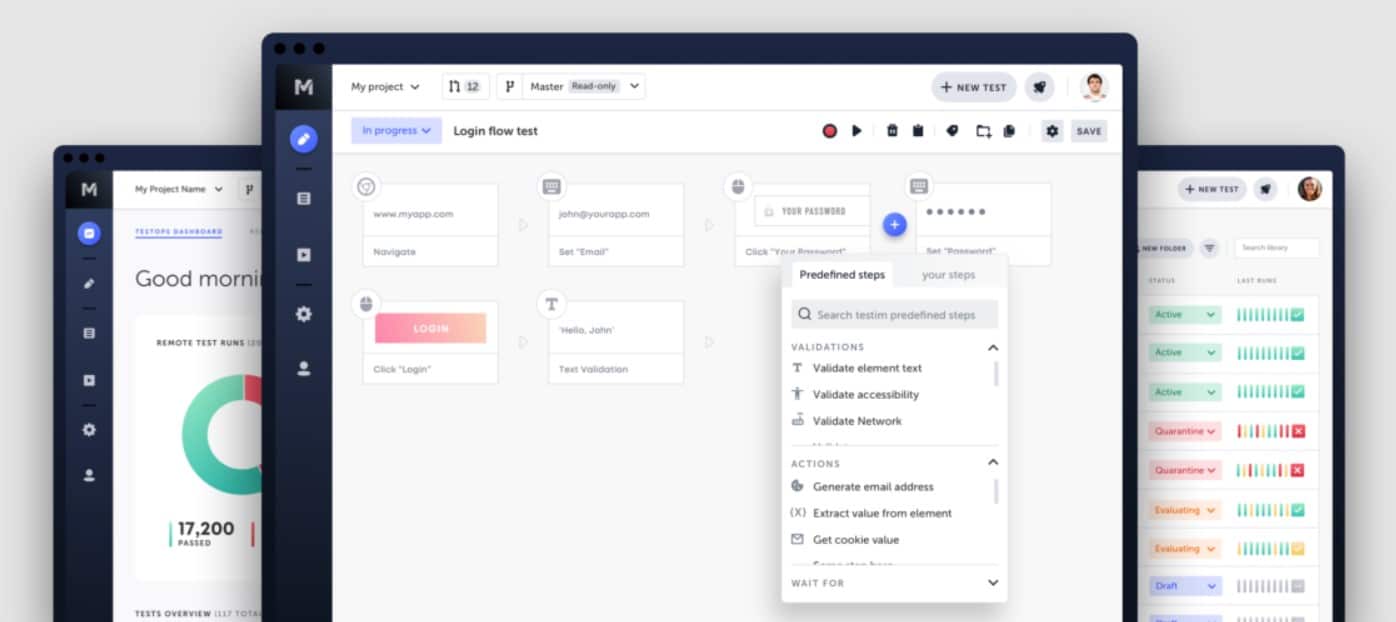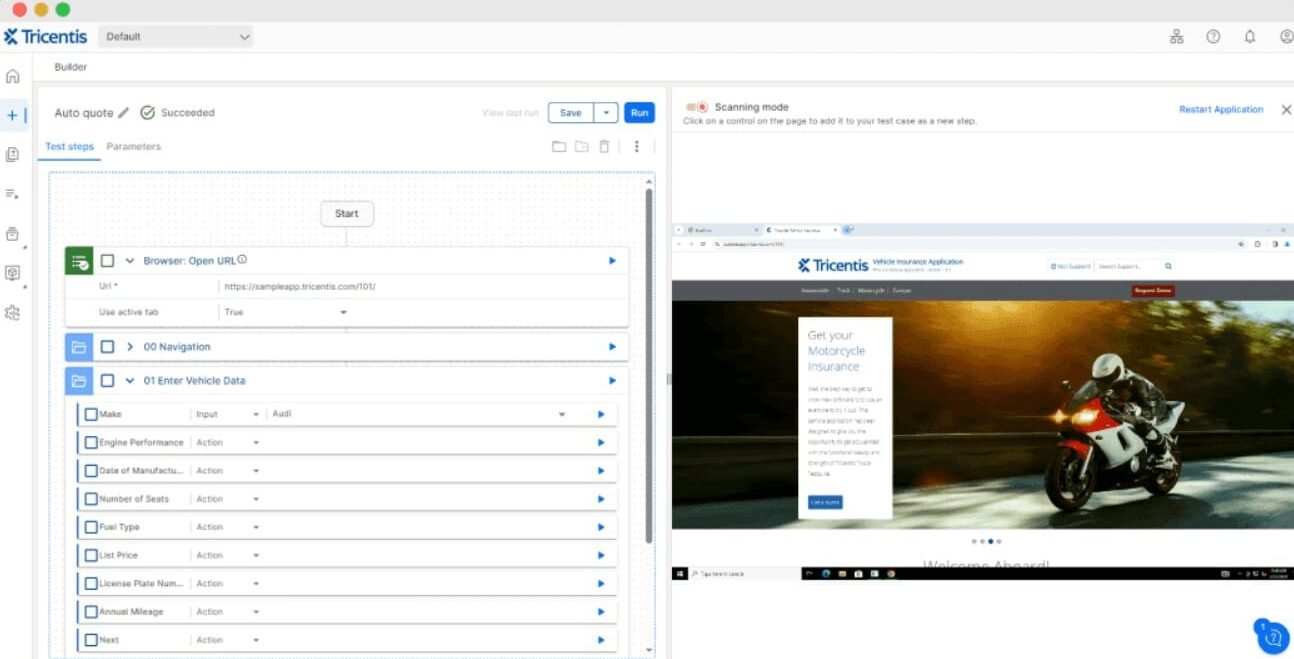We may earn a commission if you make a purchase through the links on our website.
The Best Browser Testing Automation Tools

UPDATED: September 2, 2024
Browser testing with automation can drastically speed up the process and cut costs. When it comes to testing browser applications, there are countless minor inputs necessary to test every aspect of a given website rigorously. Repeating each of these actions, often hundreds of times, is unreasonable for a human. Therefore, automation is necessary, and there’s a wide variety of automation software that can rapidly perform the necessary testing across many browsers.
Here is our list of the best tools to automate browser testing:
- Tricentis Testim – EDITOR’S CHOICE A cloud-based AI-driven for testing Web applications on Edge, Chrome, Firefox, and Safari browsers. This system can be integrated into a CI/CD pipeline for automated testing in a DevOps environment. Get a 14-day free trial.
- Tricentis Tosca – FREE TRIAL Software testing for desktop systems, APIs, Web applications, and mobile apps with browser-based testing for websites. Offered as a cloud platform or as a software package for Windows Server. Get a 14-day free trial.
- TestComplete – A GUI testing automation tool with extensive browser testing features. An AI-powered specialized testing object recognition utility combines with CI/CD integration for comprehensive browser testing regardless of your business scale or testing demands.
- Katalon A free automated testing tool for general-purpose UI and browser testing. Despite the free label, the software offers a complete-featured solution with scalable premium options.
- Ranorex Studio An enterprise-grade solution for dynamic automated browser testing. The solution offers both comprehensive developer tools and simplified GUI-driven testing parameters.
- Virtuoso An intelligent AI-driven testing solution that boasts advanced testing solutions, including plain English test scripting, suitable for any QA team.
- CrossBrowserTesting A web-based solution that provides an alternative to TestComplete from Smartbear offers a broad set of tools to fit many use-cases.
- Selenium A free, open-source testing framework with full CI/CD pipeline integration can enable in-depth test scripting capabilities if you have the coding know-how.
- Appium It is built for mobile application and browser testing, another free and open-source testing framework that requires some programming knowledge.
- QA Wolf An up-and-coming automated testing service geared towards smaller businesses and startup organizations.
- Specflow A free and open-source BDD framework that supports Web and Application UI testing, API testing, and more can simply interact with your existing testing solutions.
Browser Testing Methods
When testing your applications and websites, you’ll need to use the best approach to cover all of your potential object interactions adequately. You may need to use multiple approaches, sometimes at the same time.
- GUI Driven Tests These are the most simple form of test and are the most accessible by a tester without prior scripting knowledge. They typically involve determining inputs via an interface. This is the best approach if you don’t need to achieve anything overly complex with your testing or your QA Team isn’t knowledgeable about writing their test scripts.
- Scripted Tests For more advanced testing parameters, it might be best to use some form of scripting. Many of the solutions in this article come with some form of IDE/API interaction that sallows scripting. The most common form of test-based scripting is Selenium. While Selenium can be used standalone (and is one of the solutions on this list), you may find it easier to rely on one of the other solutions that take advantage of Selenium.
- Record-and-Replay Tests Another simple solution that might require more effort to set up but is just as user-friendly as GUI-driven testing is record-and-replay testing. This involves hitting a record button, performing a certain action on a website yourself, then stopping the recording. Once a recording has been saved, the testing software can repeat the recorded action countless times with minor variations each time.
- Your Testing Solution You can perform other tests, such as Screenshot testing, that are useful for testing for visual errors. You’ll need to check each solution in this article to determine what kinds of various tests they can perform.
The majority of the solutions on this list are very similar in the basic feature set and only vary in scale, capacity, and specialized testing methods.
The Best Tools to Automate Browser Testing
Our methodology for selecting a browser testing automation tool
We reviewed the market for browser testing automation software and analyzed options based on the following criteria:
- A scripting language to create complex tests
- Options to test applications in browsers and from mobile devices
- A choice of on-premises and SaaS systems
- Integration into commonly used development frameworks
- Fast and variable test cases that can be cycled through without human intervention
- A free trial for a no-cost evaluation opportunity or a free tool
- Value for money from a paid tool that is worth the price or a free tool that is worth installing
With these selection criteria in mind, we identified a number of browser testing automation tools, including free and paid systems and providing both on-premises and Web-baed services.
1. Tricentis Testim – FREE TRIAL
Tricentis Testim is a cloud platform that offers testing services for Web applications and can simultaneously run tests through multiple browsers. The tool is able to test through Google Chrome, Microsoft Edge, Mozilla Firefox, and Safari browsers. The package can be enhanced by a mobile app testing package.
Key Features:
- Record and replay
- Generates scripts with placeholders for Web page elements
- Identifies elements that have changed identities between tests
- Works with Chrome, Microsoft Edge, Firefox, and Safari
- Detailed bug reports
Why do we recommend it?
Tricentis Testim supports the testing of Web applications, which occurs through Web browsers. This package is able to run tests across different browser brands and can test the same website through multiple browsers simultaneously, keeping track of the results of each thread. This strategy provides fast and effective testing that can be automated through integration with CI/CD pipeline tools.
The Testim platform uses AI in a number of ways. The interface provides a way for a user to create a test script by walking through a site, activating different interactive elements. The system records those actions and generates scripts from them. The elements in the page are treated as placeholders and so they can be identified again during retesting even if their labels and tags have changed.
Testim is suitable for developers using the Agile model and also for in-house DevOps teams. The package is able to interact with automation and project management tools, such as Jenkins and GitLab. You can assess the package with a 14-day free trial.
Who is it recommended for?
Testim implements browser testing automation for Web applications and is suitable for use by Agile developers and DevOps teams. The package is going to appeal to larger organizations, including those companies that develop their own applications in house and also software development service providers.
Pros:
- The option to write your test scripts in JavaScript
- Identifies “flaky” test
- Runs multiple tests simultaneously
- CI/CD pipeline integration
- A mobile app testing unit is available
Cons:
- No price clarity
Tricentis Testim is a dedicated testing tool for Web applications but it also has an add-on unit available for testing mobile apps.
EDITOR'S CHOICE
Tricentis Testim is our top pick for a browser testing automation tool because this cloud platform provides an easy way for a tester to generate a test script without any coding ability. However, it is also possible to write test scripts in JavaScript; another option is to import scripts from other applications. The tool will generate scripts that replace element names with placeholders. This enables those elements to be identified again during retesting even if their identifiers and attributes changed during redevelopment. The system integrates with project management tools and code repositories to enable automated testing in CI/CD pipelines. Testim can run tests through different browsers and can operate multiple tests simultaneously, which is a time saver. Each defect report details the discovered bug, which makes recoding a much easier task. This service is ideal for use by Agile development providers and DevOps teams.
Download: Get a 14-day free trial
Official Site: https://www.testim.io/test-automation-tool/
OS: Cloud based
2. Tricentis Tosca – FREE TRIAL
Tricentis Tosca provides enterprise-wide software testing services that will test desktop systems, APIs, mobile apps, cloud-based services, and Web applications. The testing of Web assets is performed through Web browsers and that category of testing can also be passed through Selenium. This package will test with Google Chrome, Microsoft Edge, Internet Explorer, and Mozilla Firefox. It can also run tests with Safari browsers through Selenium.
Key Features:
- Model-based test automation that expresses business unit purposes
- Test cases are generated from business models
- Component reuse for business process-linked functions
- Multiple formats test a software package in all delivery methods
- Cross-application integration testing
Why do we recommend it?
Tricentis Tosca can test all software and also assemblies of systems, so it will test the cohesion between applications that are linked together for workload automation. The package includes connectors to Oracle, SAP, and Salesforce ERPs and CRMs. The Web application feature in the package can run tests through Microsoft Edge, Internet Explorer, Firefox, Chrome, and Safari browsers.
Tosca can test a range of assets and can be set up to trigger off a new checking of a module into your code repository. The tool supports a range of testing methods, including, including functional and regression testing. The system can perform dynamic testing by running APIs and functions and checking on results. The system also provides load testing.
Who is it recommended for?
Tricentis Tosca is designed for use by large software developers for collaboration with their clients in Agile development projects and also for in-house DevOps trams. The package isn’t limited to Web application testing, so it offers wider functionality than the Tricentis Testim package. The tool can perform integration testing to examine how multiple systems work together.
Pros:
- Test prioritization of tests according to risk
- Works with Chrome, Firefox, Microsoft Edge, and Safari
- Compatible with Selenium
- Stores test data
- Integrates with Jenkins, Azure DevOps, and Bamboo
Cons:
- Not limited to browser testing
Tosca is delivered as a SaaS platform on the cloud but Tricentis also offers the package as a software download for Windows Server. You can assess Tosca by accessing a 14-day free trial.
3. TestComplete
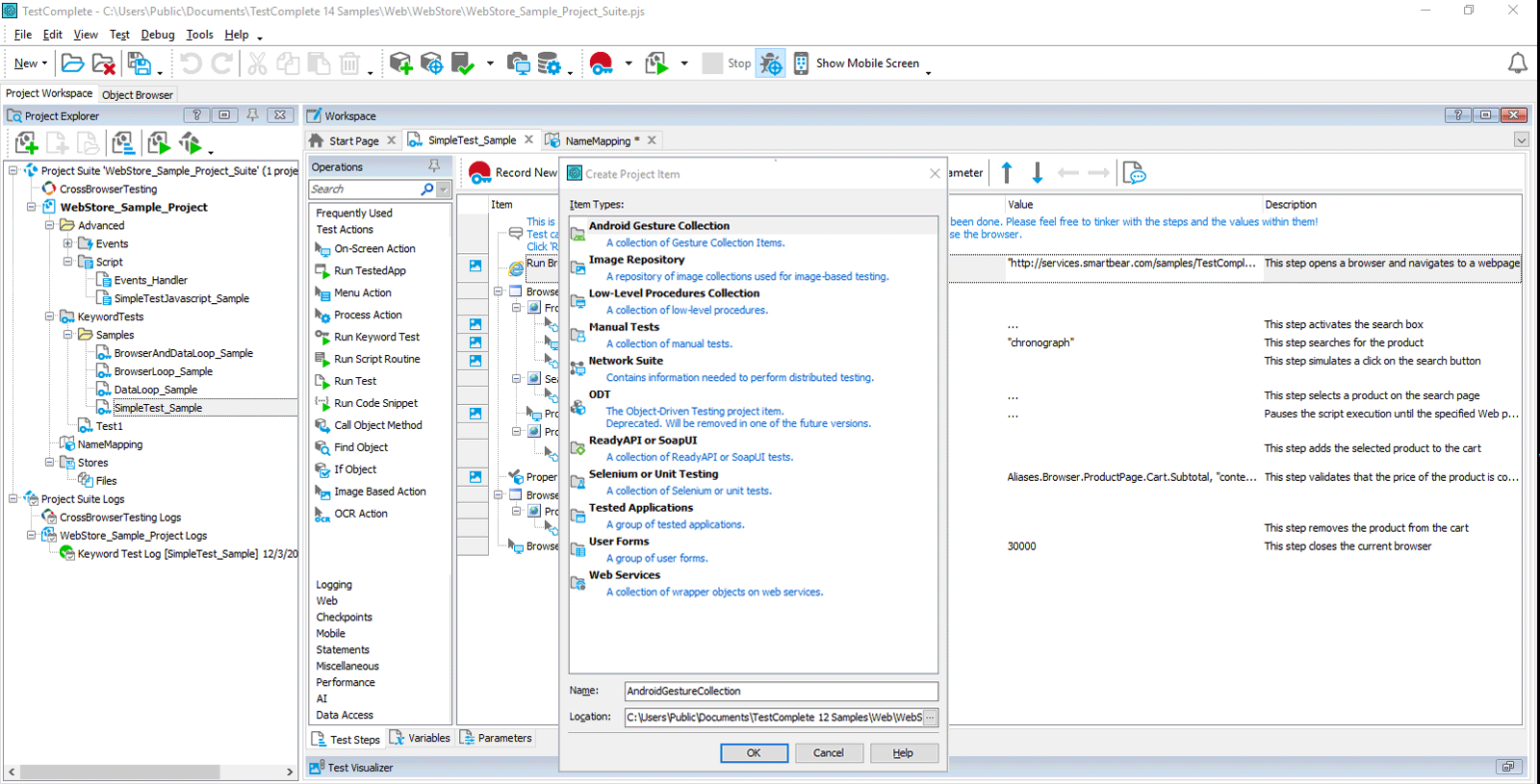
TestComplete is a GUI test automation tool that boasts an impressive AI-powered object recognition tool that makes browser testing much smoother. In addition, you can script more elaborate tests through the inbuilt scripting tools or use the interface for simple tests without prior scripting knowledge.
Key Features
- GUI browser test automation
- Scripting tools
- CI/CD integration
- Record-and-replay tests
- Cross-browser testing
Why do we recommend it?
TestComplete is an automated UI testing tool that uses inbuilt scripting tools and AI powered techniques to test different browsers. It even comes with several CI/CD integration options that can make the whole process simple.
TestComplete works perfectly well for browser testing and supports desktop application and mobile app/browser testing. In addition, there are several CI/CD integrations available, including Jenkins.
TestComplete has a 14-day free trial available on the company website. Prices for the entire product are divided by single-user packages and multi-user packages, with the multi-user ‘float’ products being around double the price of the ‘node-locked single-user products.
Who is it recommended for?
Large businesses with a good budget might find it a suitable product. Small businesses, on the other hand, might not find the premium edition suitable as it is a bit expensive. However, they can use the free tool to test applications written in different programming languages and record and playback browser tests.
Pros:
- Uses AI to realistically test browsers
- Supports cross-browser compatibility testing
- Can record and playback browser tests
- Supports a wide variety of scripting options
Cons:
- The interface can feel cluttered when testing many browsers at once
- Better suited for enterprises
The Base product is $2,256. The Pro version combines desktop, mobile, and web testing and costs $3,950. Finally, the UI Test Plus Bundle includes all of the features of the Pro version but also has cross-browser testing, which may be vital for significant scale testing endeavors.
4. Katalon
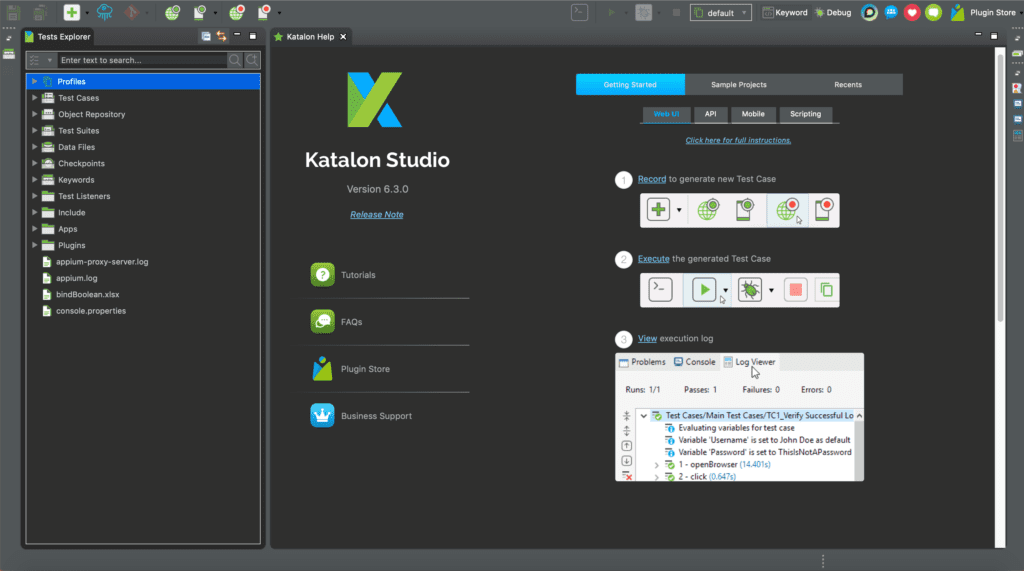
Katalon is a free automated testing tool for general-purpose user interface testing. You can use the software to construct complex automated scripts, even if you have no prior scripting experience. You can also use the recording tools to establish automated CI/CD testing parameters and the IDE and a variety of choices for advanced purposes.
Key Features
- Record/Replay browser testing
- IDE for automated test generation
- AI-driven test execution
- Jenkins, Azure, Bamboo, CircleCL, etc. integration
- Modular pricing options
Why do we recommend it?
Katalon has a sleek user interface, is compatible with all operating systems and browsers, and comes with a cloud-based test launcher. It even supports a keyword-driven approach and data-driven functionality to execute tests.
The software includes full browser testing functionality. To run multiple browser testing instances at once, you may need to upgrade to the TestOps package. You may also want to consider the Runtime Engine package, which adds CI/CD integration.
Katalon supports all operating systems, browsers and devices, and can be managed from a cloud-based platform. The base software, Katalon Studio, is entirely free to download. If you handle multiple converging test pipelines as part of CI/CD management, you may also consider the TestOps component that provides test orchestration tools.
Who is it recommended for?
Large developers will find it a more beneficial option than small coding teams as the paid version comes with more advanced capabilities and support options. Smaller teams, on the other hand, can choose the free edition due to a bit expensive pricing model.
Pros:
- Sleek user interface
- Can replay and record browser tests
- Offers flexible pricing plans
- Uses AI for more accurate testing
Cons:
- The interface can feel cluttered when testing many browsers at once
- Better suited for enterprises
The essential software is free for up to 2,000 test executions per month, with scalable pricing models for more requirements. In addition, all premium features have a free trial available on the website.
5. Ranorex Studio
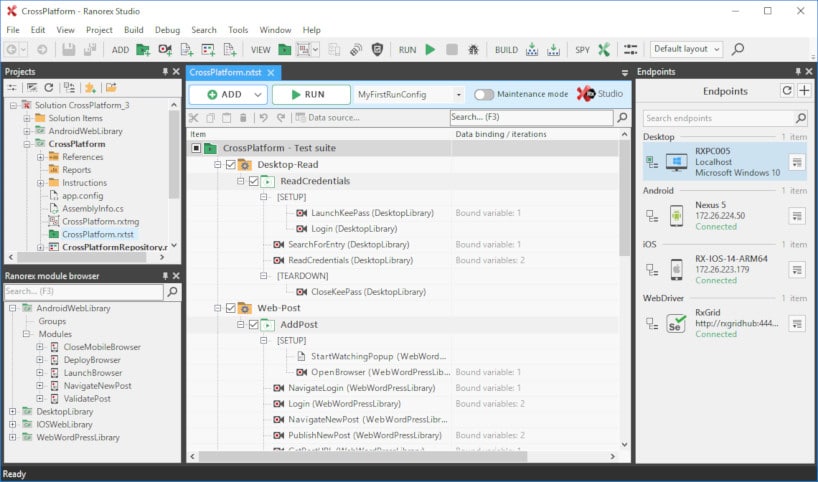
Ranorex Studio is a premium UI testing tool developed for both novices and experts, with advanced GUI-based settings that can give testing techniques without the need for prior coding knowledge. It also comes with an in-depth object inspection tool and the ability to create recorded testing criteria that adjust automatically based on intelligent object detecting methods.
Key Features
- Record/Replay browser testing
- Object inspection tools
- C# and VB.NET IDE
- Testing parameter assistance
- Jira and TestRail integration
Why do we recommend it?
Ranorex Studio is a cross-browser testing tool that supports several standard programming languages for creating custom tests and replaying them. Non-programmers or experts can run both manual and automated tests with this tool.
The software’s browser testing suite simply opens the website and uses the dedicated plugin to run automated tests within the browser environment. In addition, several productivity and assistance tools are built into the software to ensure test development is quick and easy.
Who is it recommended for?
Ranorex Studio is the perfect solution for large businesses and organizations that run tests on web-based applications extensively.
Pros:
- Robust browser testing
- Supports both manual and automated tests
- Features an object inspection tool
- Can create and replay browser tests
Cons:
- Better suited for larger businesses or MSPs
Ranorex Studio is one of the more premium solutions available for UI testing. The software costs around $3,500 for a perpetual Studio (single-user) license or around $5,600 for a perpetual Enterprise (floating) license.
Ranorex Studio supports Microsoft IE, both the Chromium and Legacy versions of Microsoft Edge, Mozilla Firefox, Google Chrome, and Chromium.
6. Virtuoso
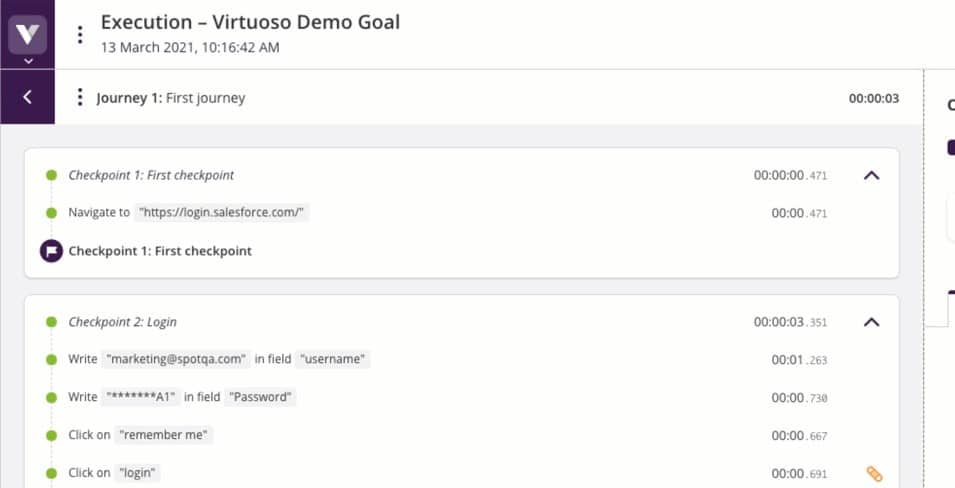
Virtuoso is the leader of the pack in terms of intelligent AI-driven automated browser testing. The software breaks down script testing to use human-orientated plain text language, meaning anyone can feasibly set up test parameters in line with other script-based solutions.
Key Features
- Intelligent AI testing
- Plain English test scripting
- Snapshot testing
- Cross-browser capabilities
- ‘Self-healing’ tests with adaptive learning
Why do we recommend it?
With the help of an AI-powered testing tool, programmers can quickly identify the page elements, run auto-healing tests, and provide real-time feedback. Additionally, it is quite simple to use and comes with snapshot testing functionality.
One impressive feature that Virtuoso advertises is the ability to use AI systems to identify objects after they are rearranged, which means the tests effectively maintain themselves. Multiple browser tests and snapshot testing also help you massively reduce potential flaws without increasing the testing workload.
Who is it recommended for?
Businesses of all sizes can use the tool and choose from the different packages available as per their budget. Small businesses might find the starter plan suitable whereas the medium-large scale teams might look forward to the Growth plan.
Pros:
- Uses AI to automate browser testing
- Uses simple object-based language for scripting tests
- Supports snapshot testing
- Is easy to use
Cons:
- Must contact for pricing
Virtuoso has divided its product lineup into three plans. The Starter Plan can support up to 2500 test executions per month and is geared towards smaller QA teams. The Growth Plan supports up to 5000 test executions per month and is orientated towards medium-large scale teams.
Alternatively, the Enterprise option removes limitations dependent on the scale of your business. However, regardless of the plan you choose, you’ll need to contact the company directly for a personalized quote on pricing.
7. CrossBrowserTesting
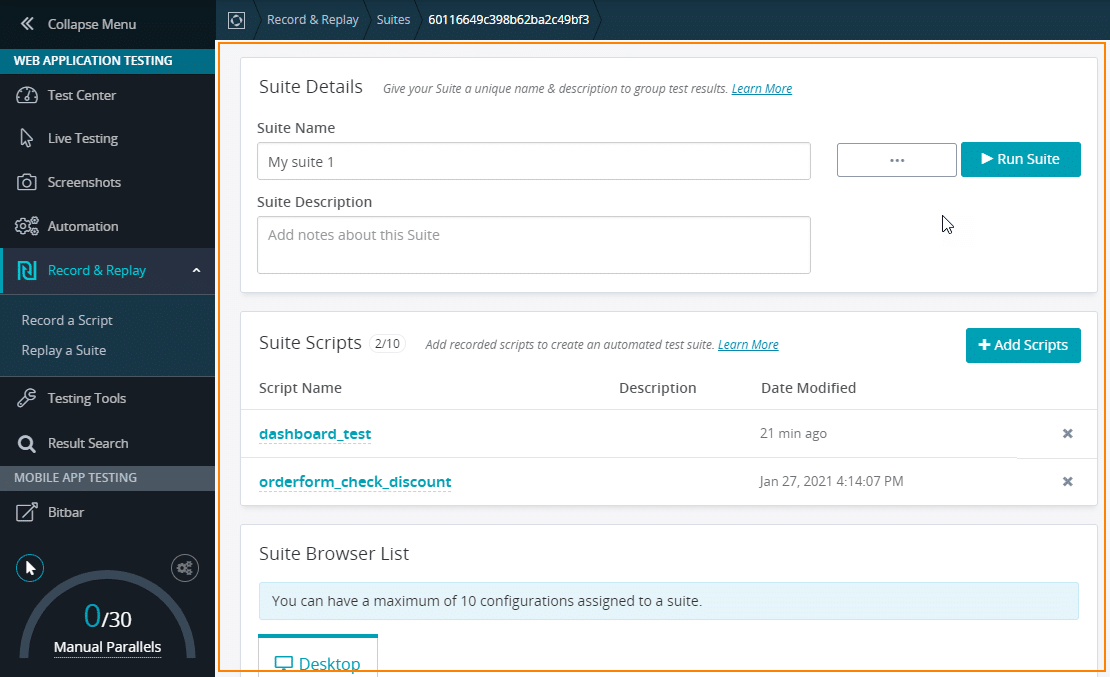
CrossBrowserTesting is another solution provided by Smartbear that provides powerful automated browser testing tools. The product is divided into four main feature sets: live manual testing, automated visual testing, record-and-replay testing, and finally, automated Selenium/Appium integrated testing.
Key Features
- Live interactive testing
- Record-and-replay tests
- Selenium and Appium integration
- CI/CD integration
- REST API
Why do we recommend it?
With this Cloud-based browser testing tool, programmers can access 2050+ browser configurations and record/replay tests with ease. It comes with live interaction testing functionalities, extensions, and integration support.
By moving automated testing into the cloud, it allows for better management and test delegation. The product also features a REST API for customization and integration with other products. CrossBrowserTesting can also work alongside tools like Jenkins, TeamCity, Github, and Jira to smoothly fit into your CI/CD pipeline.
Who is it recommended for?
The flexible pricing model makes it a great deal for enterprises and large-scale businesses. Small businesses can even try the free trial session of the product.
Pros:
- Cloud-based browser testing
- Integrates well into other tools like JIRA and Github
- Supports live interaction testing – great for granular tests
Cons:
- Better suited for SMEs
While TestComplete could be considered an Enterprise or large-scale business product, CrossBrowserTesting has more flexible options. For example, the essential Live Testing product is $29/user per month, while the full Unlimited Testing product is $100/user per month.
There is a free trial of the product available on the website. Smartbear also offers Enterprise options for CrossBrowserTesting, though you need to contact the company directly for a personalized quote on pricing.
8. Selenium

Selenium, the framework on which Katalon is based, is also an open-source solution that offers three main features: web automation testing, a development IDE for test scripts, and a central management point. However, in contrast to the other options, Selenium provides a basic framework with no interface and demands advanced fundamental programming skills.
Key Features
- Scripted web automation testing
- Development IDE
- Multi-environment management
- Browser interaction record-and-playback
- Open-source and free
Why do we recommend it?
A trusted lightweight, open-source solution that offers test scripts and supports automated web and mobile testing features. It is highly scalable and comes with advanced reporting and monitoring options as well as integration.
Selenium's three primary functions are all completely free and fully integrated into various CI/CD platforms. As a result, selenium may be the ideal option for your small-to-medium-sized organization if you have a QA team with advanced programming skills or if you simply wrap your testing within the responsibilities of your DevOps team.
Who is it recommended for?
It can be the best choice for small-to-medium-sized businesses, especially if they have a QA team with extensive programming knowledge or if they just incorporate testing into your DevOps team's responsibilities.
Pros:
- Completely open-source project
- Extremely lightweight
- A good option for those looking for barebones browser testing
Cons:
- Could use better GUI features
- Requires programming knowledge
You can download Selenium from the website for free. Selenium Webdriver is a web automation testing suite that supports C#, Ruby, Java, Python, and Javascript. Selenium IDE provides the script creation platform with browser integration and supports Chrome, Firefox, and Edge.
Finally, Selenium Grid is the management and multi-environment orchestration platform and must be installed on a central server to be installed on. While you don’t need Selenium Grid for your CI/CD pipeline, it will likely be worthwhile for the full integration.
9. Appium
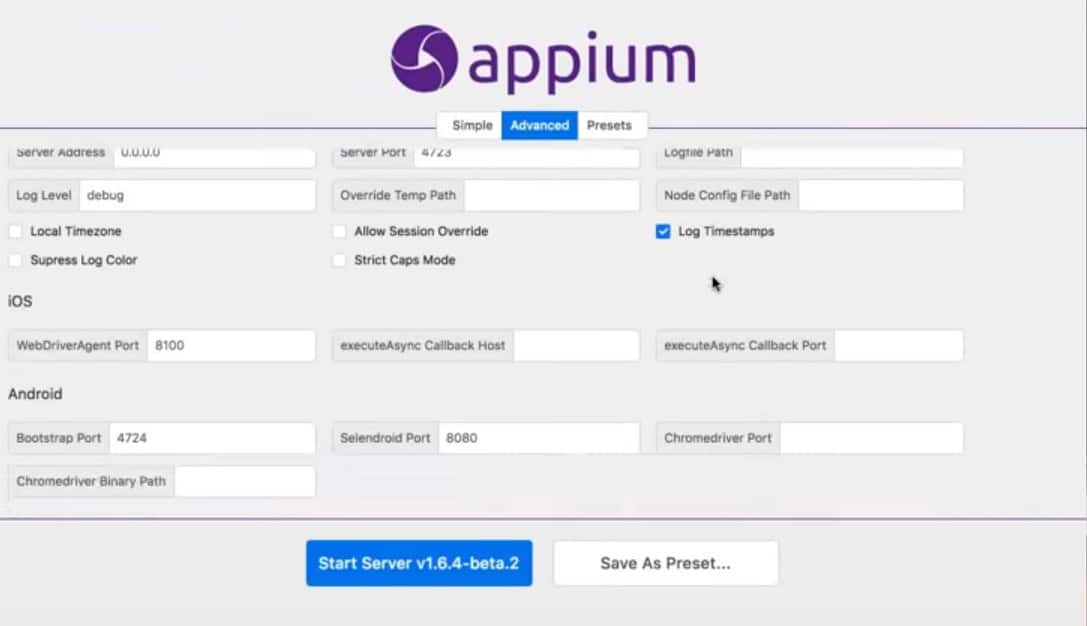
Appium is a mobile browser testing tool similar to Selenium and is free and open-source, with extensive documentation and support. Furthermore, it may be used with Selenium to extend your web browser testing capabilities to mobile browsers.
Key Features
- Mobile browser testing
- Selenium and Katalon integration
- Scripted automation testing
- Substantial support base
- Open-source and free
Why do we recommend it?
It is a free and user-friendly tool that not only tests web applications but also mobile browsers. Additionally, it integrates well with other products like Selenium and Katalon as well as allows users to create scripts or programs, to automate web browser interactions.
Getting the most out of the development framework takes advanced programming skills, similar to Selenium testing. Nonetheless, it has a valuable desktop interface for more in-depth app visualization. You may also combine Appium with a variety of CI/CD pipeline systems for your automated mobile testing needs, as well as Katalon.
Who is it recommended for?
Appium might not be a suitable option for enterprise environments or large dev teams with a variety of skill sets as may have a steeper learning curve and need more training resources.
Pros:
- User friendly – doesn’t require programming knowledge
- Focuses on mobile browsing where a vast majority of traffic now comes from
- Supports various integrations
Cons:
- Not ideal for large dev teams or enterprise environments
You can download Appium from the website for free; however, client and server versions are available. For testing iOS browsers, you’ll need to install the framework on Mac OSX. While testing for Android, you can install the framework on either Mac, Windows, or Linux.
10. QA Wolf
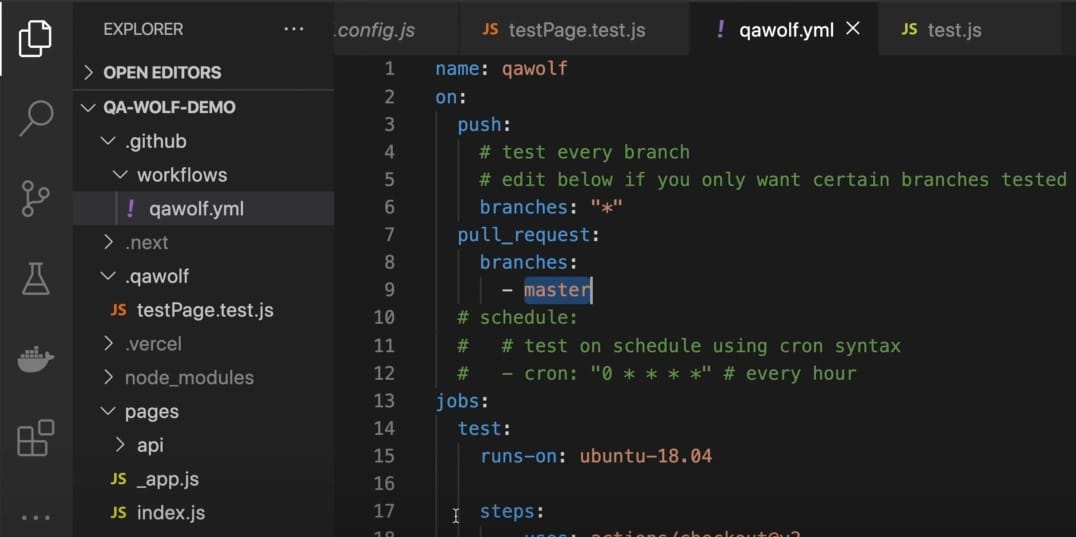
QA Wolf is an up-and-coming automated testing solution designed for startups and small businesses. You can create and manage automated testing parameters and integrate them into your development environment using the service. The answer is open-source with a large amount of support and documentation for its use. The system also generates scripts based on recorded actions, smoothing test generation regardless of scripting know-how.
Key Features
- Automated test scripting
- Record-and-replay tests
- Open-source (but still charged for hosting)
- CI/CD integration
- Flexible costs
Why do we recommend it?
QA Wolf offers automated end-to-end test coverage and generates scripts. It even supports CI/CD integration, 24-hour test maintenance, unlimited test runs, and generates human-verified bug reports.
The flexibility of the service is the main draw for this solution, with costs dependent on user needs and the automated tests being incredibly customizable through the scripting systems. However, the answer is built from the ground up with smaller teams in mind, so it isn’t recommended for groups that need more scalable solutions.
Who is it recommended for?
The tool is best suitable for startups and small businesses as it was designed keeping smaller teams in mind. Large businesses that require more scalable options might not find it of greater use.
Pros:
- Excellent user interface
- Designed specifically for QA teams
- Built on an open-source platform
Cons:
- Is fairly complex – designed for programmers
QA Wolf charges a flat monthly fee for all running test instances, the price of which depends on the scale of your team and testing demands. Therefore, the pricing is incredibly flexible, but as a result, you’ll need to contact QA Wolf directly for a personalized quote on pricing.
11. Specflow
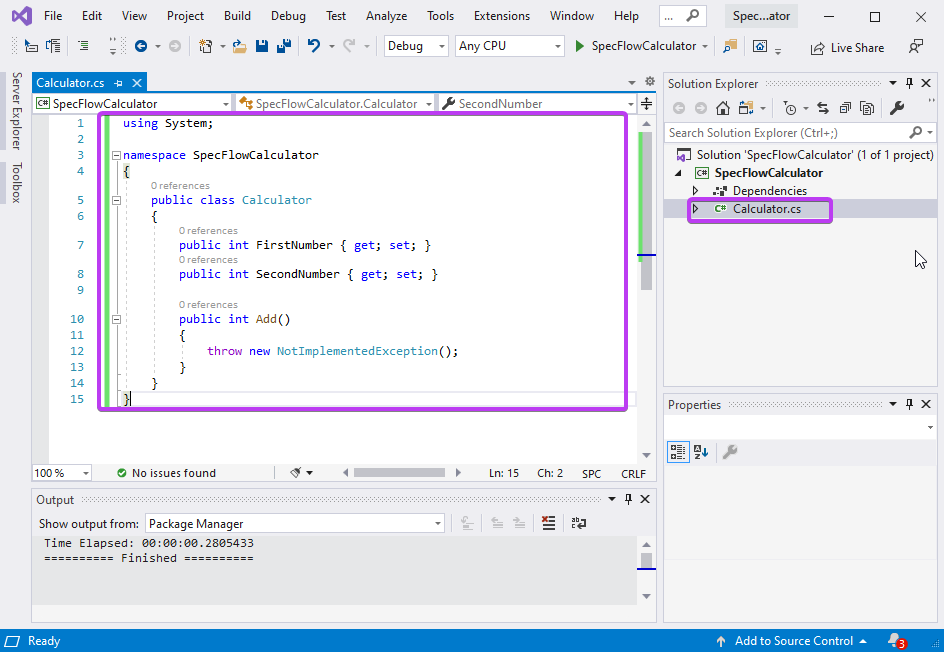
Specflow is an open-source framework that integrates Behaviour Driven Development (BDD) into the testing cycle, extending the capabilities of several testing systems. For example, Specflow can extend Selenium's automated browser testing or provide REST web services with in-depth API automation capabilities.
Key Features
- BDD Testing framework
- Expanded automated browser testing
- API development automation
- Mobile and desktop application automation
Why do we recommend it?
SpecFlow streamlines test automation by fostering a collaborative environment and optimizing the utilization of skills across all roles. It integrates well with Specflow+ Living Doc and allows users to run advanced automated testing for browsers, APIs, and REST web services free of charge.
Specflow is a framework that may be used to do a wide range of tasks. It does, however, rely on integrating other systems. For example, for browser testing, you’ll need to combine this solution with Selenium, but if you do, it can grant you more advanced automation techniques surrounding BDD.
Who is it recommended for?
.NET Developers and businesses with complex applications can make the best use of SpecFlow to run tests and perform a wide range of tasks.
Pros:
- Completely open source framework
- Can test APIs and REST web services
- Supports tools for manual analysis
Cons:
- Relies on a variety of integrations for different types of tests
Specflow is completely free and open-source, and it may be downloaded from the Specflow website or as a Visual Studio plugin. If you're already familiar with BDD and wish to improve your testing capabilities, this solution could be ideal. Most CI/CD solutions, such as Jenkins, TeamCity, and GitLab, can be integrated with the Specflow+ Living Doc.
In Summary
The above article explores eleven different automated browser testing solutions in close detail. Of course, it’s up to you to decide what specific solution is right for you, but use our article to focus on the ones that interest you the most.
The solutions vary on two different axes: complexity and scale. For example, using Selenium or Appium could be considered more complex than using a full-featured product. Still, flexibility means performing elaborate testing that might not be available on another solution.
Alternatively, something like TestComplete or Ranorex includes the tools to achieve a vast array of tests based on whatever parameters you might desire. But they also use a GUI to streamline the setup process, reducing necessary complexity.
However, those solutions come with an enterprise price tag, so that you might favor a budget solution like QA Wolf or CrossBrowserTesting. They still provide a functional testing interface to streamline test parameters drastically, but their flexible pricing means they are suitable for small to large-scale businesses.
Browser Testing Automation FAQs
Can Selenium automate browser?
Selenium is a browser automation system that is designed for application testing. It won’t provide any automation for desktop systems. Thus, you can use Selenium to cycle through many variations of tests to run every possible combination of inputs to any new function in a Web page.
Why we do cross browser testing?
Cross-browser testing refers to a Web application testing tool that is able to run its tests through a number of different browsers. This is important because there might be settings or quirks in one particular browser brand that your new Web page functions won’t work with. You can’t control which browsers users access your site with, therefore, you need to cover all bases and make sure that your new code works as expected in every browser type.
What is browser based testing?
If you produce a new website, Web page, or function in a site, you need to ensure that will work in the real world when it goes live. The only way to ensure that a Web application works in a browser is to test it in that browser. You should test your new application in every available browser so that you ensure maximum accessibility. It is also necessary to run through every possible input that a user could try on your site. There might be many combinations of input, so a complete test requires high-speed automation.
